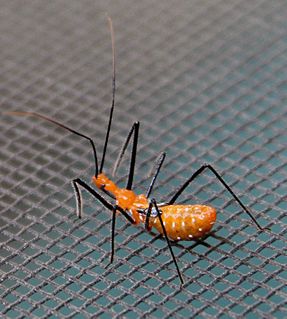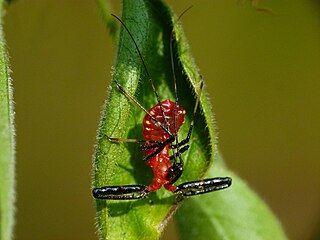Vitumnus is a genus of assassin bugs, in the subfamily Harpactorinae.

The Harpactorinae are a large subfamily of the Reduviidae. About 300 genera and 2,000 species worldwide have been described. Some of the species of the genera Zelus, Pselliopus, Sinea, and Apiomerus are of interest as biological pest control agents.

The Apiomerini are a tribe of the Harpactorinae. This tribe is restricted to the New World and consists of 11 genera.

Harpactorini is a tribe of the Harpactorinae. This group is the most diverse of the entire assassin bug family, with 51 genera recognized in the Neotropical Region and 289 genera and 2003 species overall.
Harpactor angulosus is a species of true bug (Harpactorinae). This assassin bug has been documented preying on caterpillars of the genus Hylesia in Viçosa, Minas Gerais State, Brazil. Caterpillars of this genus are an agricultural pest. H. angulosus, like other species of Harpactorini, has potential as a biological pest control agent.
Camptibia is a genus of assassin bugs in the subfamily Harpactorinae. It is reported from China. The lone species is Camptibia obscura.
Coilopus is a genus of the assassin bug family (Reduviidae), in the subfamily Harpactorinae. Species of this genus mimic wasps of the genus Vespa.

Repipta is a mostly neotropical genus of assassin bug, family (Reduviidae), in the subfamily Harpactorinae.
Cosmoclopius is a genus of South American assassin bugs, in the subfamily Harpactorinae.

Euagoras is a genus of assassin bugs, in the subfamily Harpactorinae. Species are found in Asia and Australia.
Irantha is a small and little-known genus of assassin bug family (Reduviidae), in the subfamily Harpactorinae. Just four species have been described.

Pselliopus is a common genus of assassin bugs (Reduviidae), in the subfamily Harpactorinae. The genus is restricted to the New World, with 27 species described. Some species, such as Pselliopus barberi, are conspicuous because of their bright coloring and relatively large size. Some species of the genus are of interest as potential biological pest control agents.

Zelus longipes is an assassin bug (Reduviidae) that is a member of the Harpactorinae subfamily. Its distribution ranges include southern North America, Central America, and South America, especially in agroecosystems in Brazil.
Zamolxis is a genus of assassin bugs, in the subfamily Harpactorinae.
The Dicrotelini are a tribe of assassin bugs in the subfamily Harpactorinae. Originally described by Carl Stål, genera and species have been recorded from Asia and Australia.

Epidaus is a genus of assassin bugs with about 25 species mainly distributed mainly in the Oriental Realm with two species which extend into the Palearctic Realm. Most species have a long and narrow body with the pronotum having a posterior margin with raised corners and spiny outgrowths facing outwards. The head a tubercle behind the base of each of the two antennae.

Rihirbus is a genus of assassin bug from the tropical parts of the Oriental region. They belong to the Harpactorinae and the genus is unique in having the fore tibiae with incurved tips and the apex having a long tooth. They show sexual dimorphism and are polymorphic making their identification to species complicated. Females are larger and wider. R. trochantericus takes about 49 days to develop from egg to adult in southern India.
Astinus is a genus of assassin bug, in the subfamily Harpactorinae.
Tunes is a genus of assassin bug, in the subfamily Harpactorinae, containing a single described species, Tunes saucius.
Dalytra is a genus of assassin bugs, in the subfamily Harpactorinae.








